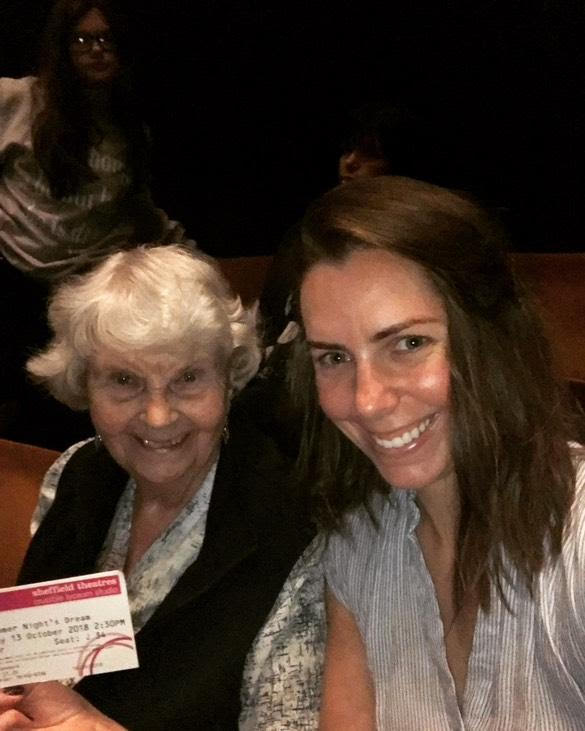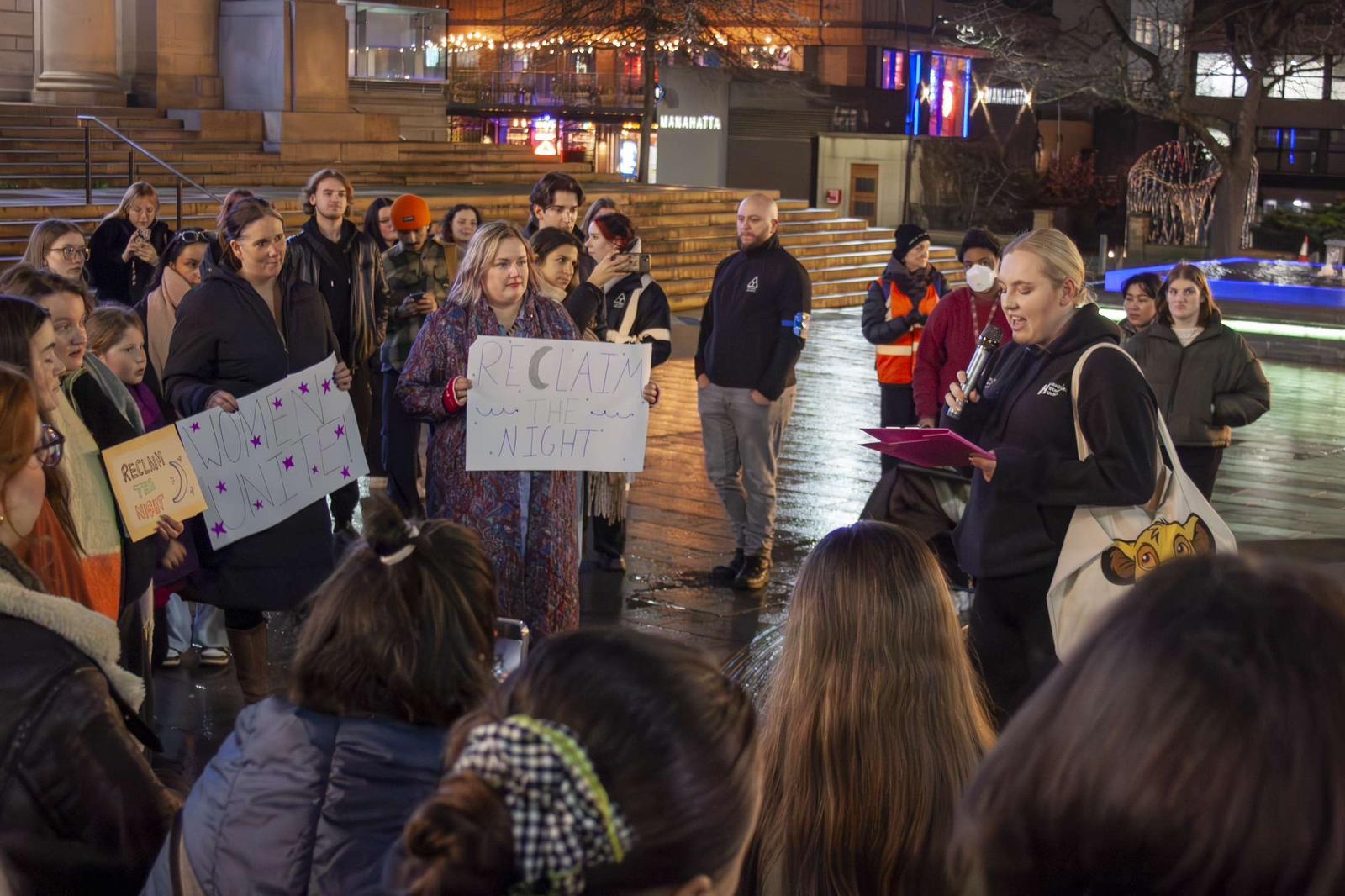
Female students unite to demand safer streets
Women in Sheffield are campaigning for safer streets during the '16 Days Against Gender-Based Violence', saying they are "scared to walk home".
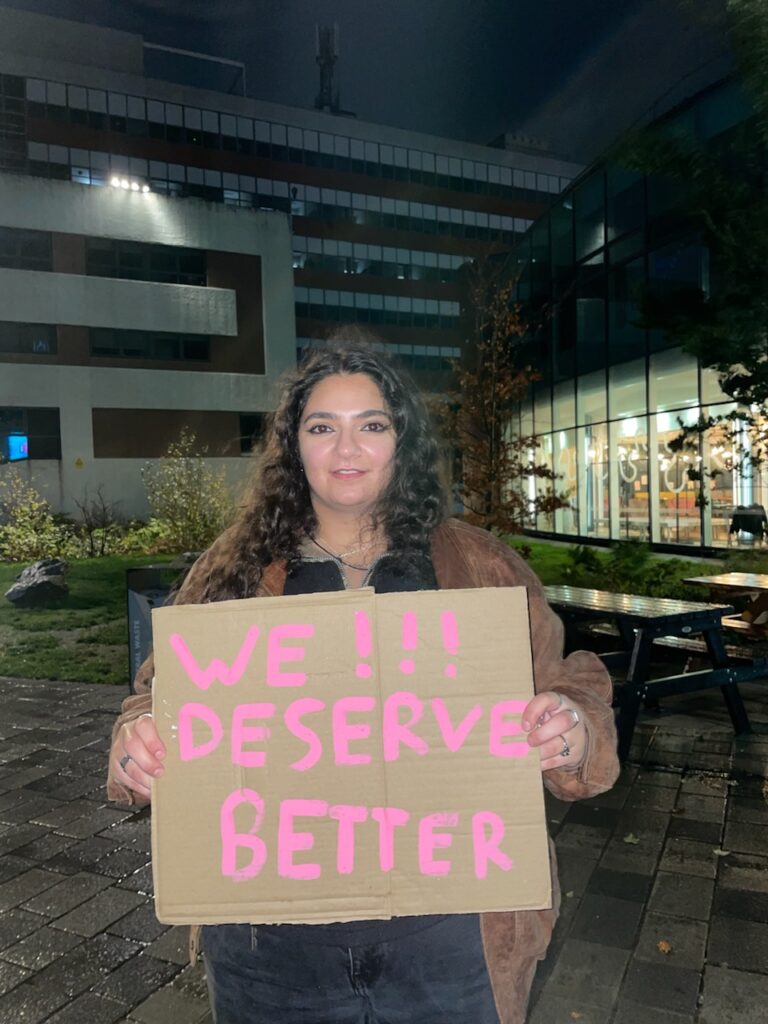
The international campaign takes place between the 25th November and 10th December and was created by the United Nations to challenge violence against women and girls.
Two Reclaim the Night marches were organised by university students to commence the campaigning as women gathered in Sheffield city centre on Saturday and Monday evening.
Eloise Taylor, Women’s Officer for the University of Sheffield, explained that the first Reclaim the Night March began in 1977 in Yorkshire in response to the “atrocious” police reaction to the murders and attempted murders of 22 women by Peter Sutcliffe.
She said the march is still important because violence against women and those of marginalised genders is still prevalent in our city.
South Yorkshire Police had the 10th highest rate across 42 police force areas of domestic abuse-related crime between 2022 and 2023.
Ms Taylor added, “We are raising awareness that the focus should not be on teaching women and people of marginalised genders; it should be on educating men.”
Women who have attended events across the week said they do not feel safe in the city at night.
Niamh, a student at the University of Sheffield, said: “We are scared to walk home at 5pm.
“We cannot do much about it, it just seems to be ignored.”
Representatives from women’s charities across the city, including Women’s Aid and the Young Women’s Christian Association, were present at Saturday’s march.
Claire Harding, Project Manager at YWCA Sheffield, said the campaigning: “Represents not just a stand against violence but a beacon of hope for a safer, more equitable world."
Last night, women across the city attended a central Local Area Committee meeting to air their concerns about night-time safety in the city to local councillors.
Across next week, both universities will host self-defense classes, film screenings, and report and support drop-ins.
Find out more: 16 Days Against Gendered Violence - Sheffield Students' Union

Sheffield United vs Sunderland: Chris Wilder previews “Friday Night Spectacle” ahead of Black Cats clash
A rocking atmosphere is expected at Bramall Lane tonight, with two high-fliers set to battle out at the top of the Sky-Bet Championship.
Sheffield United take on Sunderland, with both sides knowing a win would put them top of the league.
United manager Chris Wilder was pleased with his side's performance on Tuesday, which saw the team beat Oxford 3-0.
This continued the Blades' strong home form, with them now winning seven straight without conceding a goal at Bramall Lane.
Wilder is looking for his side to build on this consistency, ahead of tonight's clash.
He said: “We need big performances individually that lead to a team performance which hopefully leads to a big three points.
“To go to the top of the table on Tuesday night was a great feeling for everybody.”
The side have since been leapfrogged by Leeds United at the top on goal difference, after they beat Luton 3-0 on Wednesday night.
It’s been a busy week in the Championship with two rounds of fixtures in quick succession, as the busy Christmas period looms.
United are without injured trio Rhian Brewster, Kieffer Moore and Oliver Arblaster for tonight’s game, along with defender Anel Ahmedhodzic, who is suspended.
Wilder spoke of other players in the team who are starting to pick up form in the absence of others.

He highlighted Tyrese Campbell, who has 4 goals in his last 5 games, saying that he has a “glint in his eye”, and has been a great summer addition for the Blades, offering balance to their forward line.
He said: “You want your centre forwards to score and he’s doing that at the moment and that’s great for everybody.”
Campbell is looking to become the first Sheffield United player to score in four consecutive league appearances since David McGoldrick back in January 2019.
Wilder also highlighted Jesurun Rak-Sakyi, who has impressed after arriving on loan from Crystal Palace.
He said: “Hopefully we can maintain this rich vein of form and results, and Jez will be a big part of that.”
When speaking about Sunderland, Wilder said he has full respect for how their manager, Regis Le Bris, has made them a “well coached team with a lot of youth.”
The away side, who are unbeaten since September, will move ahead of United with a win.
Sheffield United vs Sunderland takes place at Bramall Lane at 8pm tonight.

Sheffield volunteer group make urgent plea to the public
Amid the cost of living crisis, Sheffield Shoebox Appeal have announced fears that they will not meet their donation target by the 1 December deadline.
The appeal set their target at 3,000 boxes this year, as there are "more people in need than ever before". However, as it stands, they have raised only half of that.
For every box we’re short, somebody doesn’t get a Christmas present.
The Appeal is made up of a group of friends who work closely with local charities and hope to provide every vulnerable or disadvantaged adult in Sheffield with a Christmas present.
Christine Sexton, a coordinator for the Appeal, said the cost of living crisis has made things difficult for them.
She said: “We’ve got this dual problem where there are more people in need, and the people who are there to help haven’t got enough money spare.”
Recipients of the boxes include homeless people, women in refuges, people in recovery from drug and alcohol addiction, and old people who live on their own.

Last year was the first Christmas since the initiative began in 2013 that they did not hit their target, and they are even further behind this year.
Christine said: “At the end of the day, for every box we’re short, somebody doesn’t get a Christmas present. That’s the bottom line.”
Box requirements typically include clothing items such as socks and hats, toiletry giftsets, and Christmas treats. A full list of what is expected can be found on the Appeal's website.
Christine said: “Don’t think it takes a long time, it doesn’t. If you can’t make a shoebox, get a giftbag. Put some things in it, some toiletries, socks, hat, chocolates, a couple of other nice things. You can do them reasonably cheaply. Places like B&M, Home Bargains, and Poundland are your friends.”
One success story comes from the University of Sheffield shoebox wrapping event which took place on 27 November, and saw over 150 boxes completed.
Andrew Woffindin, the event organiser, said: "It was such an awesome opportunity to work with the Sheffield shoebox appeal, and as a Sheffielder born and bred it was so heart-warming to be able to help local people.
"The event was an amazing success."
Most shoebox drop off points close on Saturday 30 November, but the central store is open until Sunday 1 December.

‘The Tractor Lads’ roll out the welcome wagon to raise money for special education
South Yorkshire farmers are once again ready to spread Christmas cheer to the people of Penistone and the children of Woolley Wood Special Educational School.
This Saturday, Penistone and the surrounding areas will be greeted by a convoy of festively decorated tractors and wagons rolling through their villages and towns.
This is the second time a tractor run has been organised by Facebook group ‘The Tractor Lads’ in the hope of raising £750 for Woolley Wood School based in Parson Cross, Sheffield. It was their followers who chose this year's charity through a poll of 11 different ones.
A total of 449 people voted and a massive 49.7% (223 votes) felt that Woolley Wood School deserved this year's fundraising.
One of the organisers of the tractor run, Andy Lucas, explained: “We have 100 tractors and wagons booked in to take part this year and we would like to say if you can support us in any way that would be very much appreciated. We want to give the kids of Woolley Wood School a Christmas to remember.”
The run itself will start at 4pm leaving Crowedge, and then heading through Oxspring, Cubley, and Penistone before ending back at Crowedge at 6pm.
The run is just one part of the festive fun on offer. There will be a Santa’s grotto, food and drink, raffles, auctions and a prize for the best dressed tractor/wagon.
For times and information, follow this link: Facebook

Lib Dem student beats Reform by 10 votes in Woodhouse by-election
There were only 10 votes in it, but that was enough for the Liberal Democrats to inch past Reform, in a by-election that follows a string of similar local council setbacks since Keir Starmer walked into No.10 only four months ago.
Labour fell to a distant third place with 650 votes in the Woodhouse by-election, after a recount was requested on the basis of the slim difference between the Lib Dem candidate Willis James Marshall and Reform UK's Andy Hizzard, who received 1,008 votes on a 24% turnout.
The Lib Dems showed up early to the count, with their local leader, Councillor Shaffaq Mohammed, present throughout the night. It was a sign of confidence from a party that has made a habit of pulling off by-election upsets.
Mr Marshall, a University of Sheffield (UoS) student and former Labour member, now joins the second largest grouping on Sheffield City Council having won 1018 votes.
He has pledged to listen to constituents and address local issues such as potholes.
Reflecting on the campaign, Mr Marshall noted the recent cut in winter fuel allowance as a particular bone of contention for voters he spoke with.
That cause was also taken up by the Trade Union and Socialist Coalition and its candidate Josh Crapper who scored 56 votes, as they hoped to build on their campaign to request that the council extend the household support fund to cover the 75,000 Sheffield pensioners who have lost their allowance.
The Tory candidate, Samuel Hemsley, another UoS student and former employee at BAE Systems, took the opportunity to highlight Labour’s loss of working-class support.
He gained 153 votes in total, just behind the Greens' Hannah Kate Nicklin on 168.
Saj Ghafur’s campaign had the public backing of major figures from the local and national Labour party.
Five of Sheffield MPs - including former Transport Secretary Louise Haigh, who publicly resigned this morning - were pictured with the candidate, alongside the leader of Sheffield City Council, Councillor Tom Hunt.
With Cllr Hunt taking to his phone once the final result became clear, it raises further questions as to whether a pattern is emerging nationwide, as Labour’s working-class voting base exits left, right and centre.
As Lib Dem councillors cheered their newest member, for some the result signals an altogether different milestone.
Reform scored their highest result for a Sheffield seat despite what supporters referred to as a short campaign.
The populist party had stood aside for candidates from the Social Democratic Party (SDP) - an organisation that blends centre-left economic ideas with a right-wing “anti-woke” platform - in this year’s general election, and so the strength of its voting bloc remains relatively untested.
The SDP’s candidate for Woodhouse, Matthew Leese, tallied up 33 votes.
Yesterday's by-election took place following the death in September of the independent councillor Paul Wood, aged 67.

Doncaster to host England Women’s Under 23’s for the first time
Fans will get a chance to see the “stars of the future”, when the Women’s Under 23's come to Doncaster next week for the first time.
The Young Lionesses will host Sweden at the Eco-Power Stadium, home of Club Doncaster, on Monday night.
The club previously hosted the senior Lionesses team in 2021, where they played out a record-breaking 20-0 win against Latvia.
This time round the Women’s Under 23’s will be aiming for a top two finish in Group B of this year's WU23 European Competition, a group they top after three games.
Shaun Lockwood, Chief Commercial Officer at Club Doncaster, says the club is excited to host the events in South Yorkshire.
He said: “I think it’s an opportunity to enable grassroots teams and young fans to see their teams on their own doorstep. It’s great having national events at Wembley but when you can go to your local stadiums and see the stars of the future. It’s a great opportunity for everyone to support England.”

The match will see a familiar face return to the Eco-Power, Young Lionesses manager Emma Coates, who managed the Doncaster Belles from 2016-2017.
She said: “It'll be a really special night to return to the club with the Young Lionesses.”
The club is known to have kick-started many of the current Lionesses’ early footballing careers, such as Chelsea’s Millie Bright, goalkeeper Mary Earps, and Barnsley-born Bethany England.
Mr Lockwood said: “It’s those kinds of stories that encourage young girls to know there are opportunities to progress and achieve their dreams.”
Due to the senior Lionesses’ increasing popularity following their historic Euros win in 2022 they’ve outgrown many small venues like Doncaster.
However, Sarina Wiegman’s team will travel up to Sheffield United’s Bramall Lane on Tuesday where they face Switzerland for their last international friendly match of the season.
Mr Lockwood hopes these events will generate more local interest in football, and is keen to grow the fanbase by engaging with communities.
He said: “We work really closely with the FA and junior football teams to ensure prices are affordable so that groups can come to the game.”
Club Doncaster have also visited local schools, offering free tickets to pupils, as well as capping adult ticket prices for the match at £5.
With the Lionesses playing the following day, it is hoped the Under 23’s match will be a good “warm up act” beforehand.
The club is expecting a crowd of 3,500 for the game on Monday.
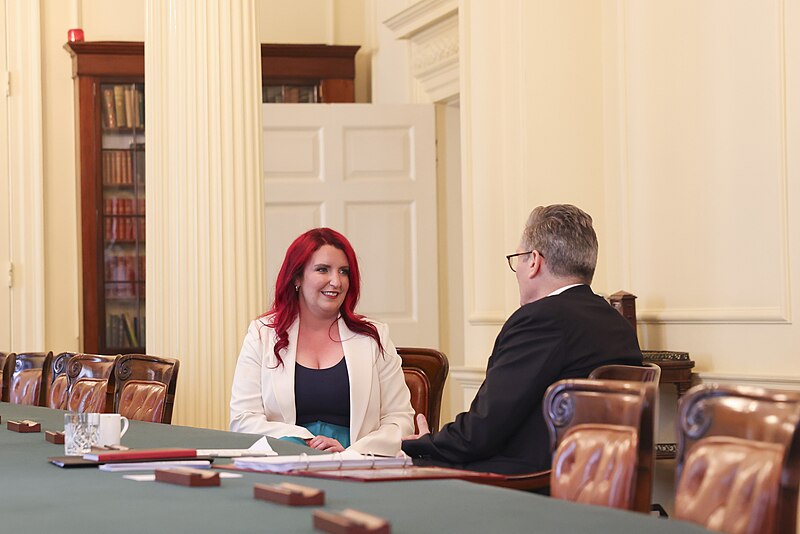
Louise Haigh resigns as Transport Secretary
A Sheffield MP has resigned from the Cabinet this morning, after a historic conviction for misleading the police came to light.
Louise Haigh, MP for Sheffield Heeley and Secretary of State for Transport, told Keir Starmer today that she will now best support his political project from outside the government.
The resignation comes after Sky News revealed last night that Haigh pled guilty to incorrectly telling police that a mobile phone had been stolen from her in 2013.
Ms Haigh said she discovered that the phone had not been taken until some time later and admitted that not telling her employer earlier was a “mistake”.
A spokesperson for the Conservative Party has said: “The onus is now on Keir Starmer to explain this obvious failure of judgement to the British public.”
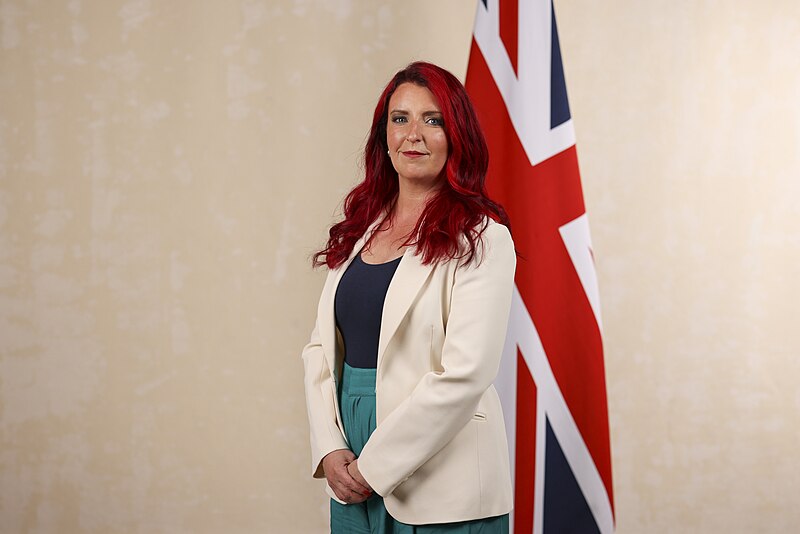
Good morning from the Sheffield Wire news room
With political breaking news coming in just now, we'll be bringing you the latest from across Sheffield and South Yorkshire this morning.
Louise Haigh, Transport Secretary and M.P. for Sheffield Heeley, has suddenly resigned, following the disclosure of a fraud conviction from 2014.
Results from the Woodhouse by-election are in, with Liberal Democrat candidate Willis Marshall taking a lead of just 10 votes over Reform UK's Andy Hizzard.
Debate in the Commons on assisted dying legislation has begun, with the vote scheduled to take place at 2.30pm.
The Palestinian flag is set to fly over Sheffield and Rotherham Town Halls to mark the UN International Day of Solidarity with the Palestinian People, following pressure by campaigners.
And we're set to hear from retailers at Meadowhall about the impact of this year's Black Friday.
We'll keep you updated on these stories and more as the day continues.
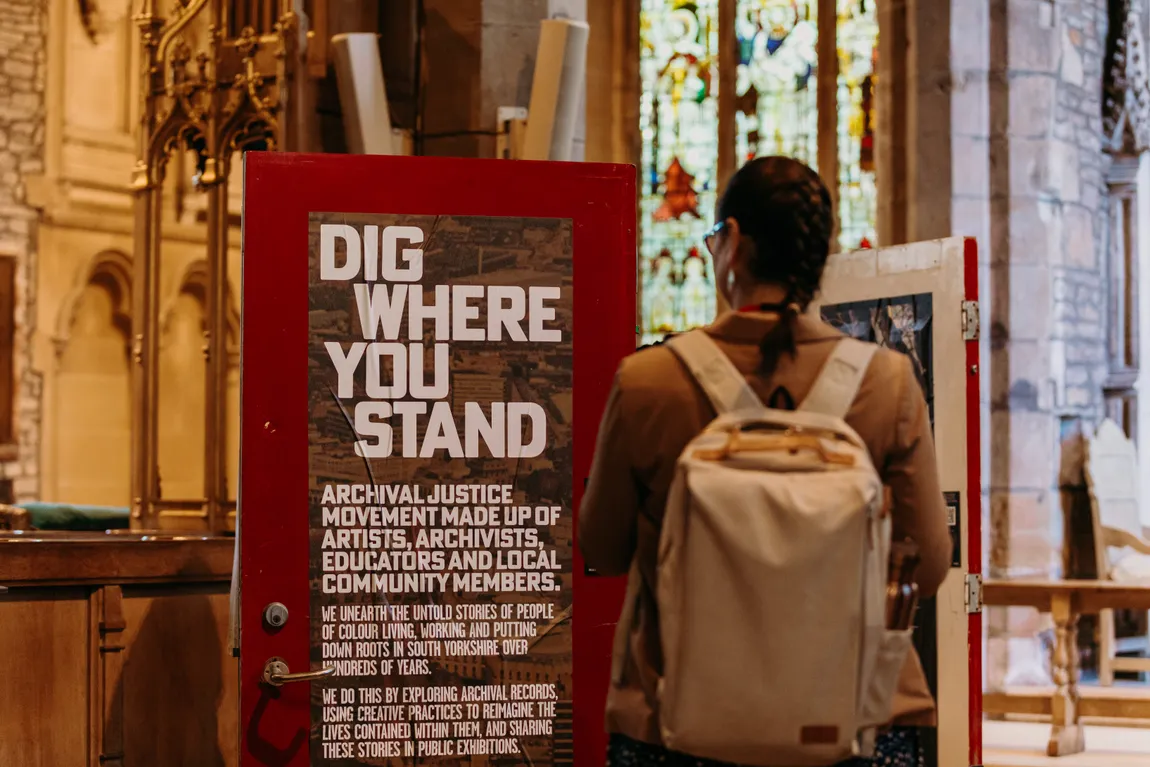
Sheffield’s ‘Dig Where You Stand’ exhibition sheds light on unheard stories
An art exhibition which explores the untold stories of people of colour, who have lived in South Yorkshire for centuries, has returned to Sheffield.
'Dig Where you Stand', which opened last month, explores the unknown history of communities that often go unheard.
The multi-venue exhibition was initiated by creative director and artist in residence at Sheffield City Archives Désirée Reynolds, in 2021.
She said: "Dig Where You Stand is not only about telling our own stories but retelling them, inserting them into the fabric of the city, and locating where we were to show where we are now."
The project reimagines the lives of African-Caribbean working-class individuals, often reduced to mere statistics in archival records.

The exhibition, which ends this Sunday (August 18) is displaying artistic pieces across a range of public spaces. There is a mixture of painting, poetry, puppetry, soundscapes, film, textiles, and live performance, from 14 artists of colour, across Sheffield city centre.
Venues include: Persistence Works, Sheffield Cathedral, Moor Market, Sheffield Central Library and the Winter Garden, all of which are free to enter.
The exhibition has taken inspiration from Sven Lindqvist who encourages people to explore their own histories, and Saidiya Hartman’s concept of ‘critical fabulation', Reynolds and other collaborators highlight the racial aspects of working-class history, particularly before 1945, challenging mainstream narratives that suggest people of colour only arrived in Britain post-World War II.
The National Lottery Grants for Heritage, who supported the exhibition, awarded over £112,000 to the University of Sheffield, and promised to; commission new works by local artists with a public exhibition, hold a year-long training programme in archives for women of colour, and create educational resources for schools and community groups.
Artist & Advisor to Dig Where You Stand, Johny Pitts, said: "I grew up Black in Sheffield without a sense of history connected to the contemporary culture that surrounded me. Dig Where You Stand is an innovative, creative and soulful corrective to the reductive version of Sheffield we so often see in mainstream media."
The project aims to disrupt the marginalisation and erasure of people of colour from historical records. By doing so, it empowers racially marginalised groups to reclaim their place in history and encourages them to explore their heritage through the archives.

Doncaster mosque working to dispel myths about Muslims
A Doncaster mosque is refusing to allow the latest far-right protests to stop them from building bridges with the wider community.
The Sultania had planned to host an open day earlier this month but was forced to cancel it after far-right protests were planned across the country following the deaths of three children in Southport.
The initiative, led by Imam Habeeb Minhas, aimed to foster understanding, dispel misconceptions, and strengthen relationships between the Muslim community and the local community. He explained those who were due to attend were disappointed by the fact it had to be cancelled.
“We sent over 300 emails to people across Doncaster, including MPs, councillors, and other organisations - all of whom shared their regret that the event was cancelled," said Iman Minhas.
The recent riots have not dampened Imam Minhas' spirits, and he and his team strive to continue their inter-faith community work and are planning to host the event next year.
Imam Minhas, who emphasised the importance of spreading awareness about Islam, said: "The main focus is to educate the masses and to build bridges between our community, the mosque, and the wider non-Muslim community.
"We wanted to create a space where dialogue could flourish, and people could ask questions regarding Islam."

The aim for the open day is to offer visitors a unique opportunity to explore the venue, ask questions, and gain insight into Islamic practices and beliefs. Attendees will also be invited to listen to the Adhan [the Islamic call to prayer] and observe the daily prayers, providing a first-hand experience of the spiritual aspects of Islam.
Imam Minhas said: “I’ve always had the vision to reach out to the wider community of Doncaster because of the potential to connect with them.
"This is where I had the idea to host a 'Discover Islam' day."

To replicate the original event, the rearranged open day will also feature a variety of interactive stalls, allowing visitors to engage with different aspects of Islamic culture. Participants will be able to have their names written in Arabic calligraphy, try on traditional Islamic clothing such as the hijab or thobe, and learn more about the history and practices of Islam.
Imam Minhas explained one of the key goals is to reach out not only to those who are already supportive of Islam but also to individuals who may hold negative views or have concerns.
He said: "We want to give those people a chance to voice their concerns and ask questions, whilst also allowing us to express our side.
"It gives people a chance to speak to an Imam and other Muslims directly, as opposed to learning about the religion through, sometimes negatively biased, news."
Jack Roberts, 23. a Journalism student at the University of Sheffield, who lives in Doncaster, expressed his support for the event.
He said: "I definitely would have been open to attending this open day. At the end of the day, we all call Doncaster home, so why should we burn bridges with each other?"
The Sultania Mosque’s initiative reflects a broader effort to promote unity and understanding in an increasingly diverse Doncaster. By opening its doors and inviting dialogue, the mosque hopes to create a more harmonious community where all residents feel welcome and respected.
That’s a wrap!!
It has been an exciting day of ups and downs for all of the political parties involved in the local elections in Sheffield and Barnsley.
The biggest shock of the day was the Conservative Party being completely wiped out of Sheffield. Labour gained the Tories only seat in the Stockbridge ward.
Sheffield's Liberal Democrat leader, Shaffaq Mohammed, is "disappointed" that his party has lost two seats in the area but the Liberal Democrats remain as the second largest party in Sheffield.
For Barnsley, the biggest blow came for the Conservative Party, after they lost their seat in Penistone East. The seat had been held by the Tories for almost 20 years by John Wilson, the former leader of the Barnsley Conservatives.
Ahead of the South Yorkshire Mayoral results tomorrow, Oliver Coppard is feeling quite confident that he will be able to maintain his position.
Mayor Coppard said: “People want to see change happening, that we’re taking the decisions that lead to them having better lives.
“That’s what government should be about. That’s what leadership should be about in politics. I hope that’s what we’ve done. I’m hopeful that that will be an endorsement of what we’ve done over the last two years and what we want to do over the next four years as well.”
Huge thanks to our Sheffield reporters, Peter and Ollie, and our Barnsley reporters, Richard, David, and Jack, for keeping us up to date with live reactions from the count!
After a long day, Amy and Kate are signing out!

